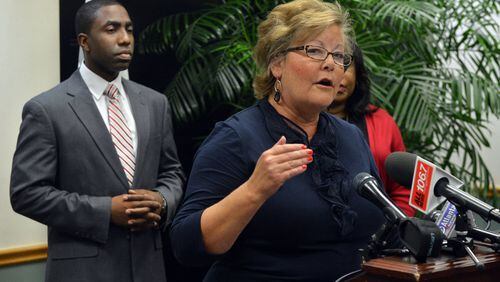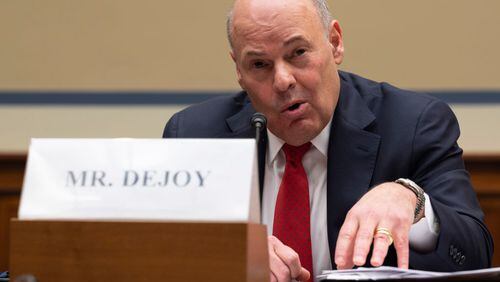A county embroiled in scandal
Earlier this year a report by a consultant, whom DeKalb County is paying $300,000, named the “stigma of political corruption” one of the top threats to economic development. Among the county’s troubles:
- Suspended CEO Burrell Ellis stands accused of 14 felony counts of strong-arming county vendors for campaign cash and punishing those who did not give. He has strongly denied wrongdoing in the case.
- Last year, former schools Superintendent Crawford Lewis pleaded guilty to misdemeanor obstruction in a racketeering case, and he's currently appealing a judge's decision to send him to jail. Another former school official and her husband were convicted of racketeering.
- An unnamed DeKalb County politician has been tied to yet another public corruption probe, accused of soliciting bribes in a 51-count federal indictment against two South Carolina businessmen alleging racketeering, bribery and theft. No one in DeKalb has been charged in the case.
Digging deep
The Atlanta Journal-Constitution has aggressively reported DeKalb County's political woes. An exclusive AJC investigation March 23 uncovered how County Commissioner Elaine Boyer charged personal expenses to her county-issued purchasing card, in some cases while she and her husband were having financial problems.
The newspaper has continued pressing for answers. Today's story details how the commissioner also spent thousands of dollars on personal cell phone charges, but refuses to provide copies of the bills.
DeKalb County Commissioner Elaine Boyer used her county Visa card to pay more than $3,700 in personal cell phone charges — yet another way she tapped taxpayers to cover her own expenses.
She says she will pay the money back, a pledge made after The Atlanta Journal-Constitution sought records of her spending.
She refuses to provide copies of the phone bills, which could detail how many phone lines she has, with a rundown of calls and texts. Instead, the commissioner provided the AJC with documentation showing she intends to reimburse the county for $3,733.03 in phone expenses.
Boyer has said the T-Mobile charges covered her two cellphones — the only cellphones she has, which she uses for both personal and county business. But she didn’t explain the high charges. Several bills, dating back to October 2012, topped $300. She used the county Visa to pay T-Mobile $488 in November, $684 in January and $528 in February.
With the cellphone expenses, and yet another airline charge for which she said she will reimburse the county, her tally of known personal spending since late 2011 is now up to $16,800. That includes purchases for herself and friends and family, including airline tickets, rental cars and a ski resort booking, an AJC investigation found last month.
She paid back many of the charges within days, weeks or months — essentially giving herself interest-free bridge loans courtesy of DeKalb taxpayers. But she didn’t reimburse thousands of dollars in other expenses until after the newspaper started asking questions.
The AJC's inquiry only covered Boyer's spending in 2012 and 2013. Despite the revelations about her misuse of the Visa card, there have been no censures, no public rebukes, no investigations launched and no requests for examination of her prior year purchases.
DeKalb Interim CEO Lee May has said he has no power to act against an elected official.
Boyer has said that she didn’t realize what she was doing was wrong, and said she would suspend her use of the card until the county has a clear policy. She has declined interview requests from the AJC since it published its first story March 23, but she told Channel 2 Action News, “Never, until the reporter actually talked to me, did I have any idea whatsoever that I shouldn’t be doing that.”
Her critics aren't buying it, pointing to an agreement she signed with the DeKalb Purchasing and Contracting Department in 2010 not to put personal purchases on the county card, and acknowledging she could face civil action or criminal prosecution for improper use.
“This is a deliberate pattern of fraud — theft and fraud,” said Joe Newton, a Gwinnett County resident who, along with a resident of Boyer’s district, filed complaints with the Board of Ethics last week.
“If (DeKalb County District Attorney) Robert James doesn’t step up and do something,” Newton said, “I’m going to go to the attorney general. He needs to appoint a special prosecutor on this case.”
A spokesman for James said the Boyer matter remains “under review.”
Withholding documents
The commissioner has told both the AJC and Channel 2 that she wants to be transparent, but she said she did not save receipts for her spending with the county purchasing card, which works like a debit card, drawing money directly from a county account.
The AJC then pointed out that Boyer — the commission’s longest-serving member and its only Republican — could obtain her phone records from the phone company. T-Mobile bills less than a year old can be accessed on the company’s website. The company will mail copies of older bills upon request.
Initially, Boyer’s office said it was obtaining the bills. In late March, an aide in her office said she was “still waiting on the T-Mobile documents.” Last week, though, she reneged on providing the information.
When the newspaper sought an explanation, she responded by email, “I have reimbursed all personal expenses. Additionally, I have suspended all use of the purchasing card, and will follow whatever new policy the Board of Commissioners adopts.”
That drew outrage from Viola Davis, who leads the DeKalb Unhappy Taxpayer and Voter group and is backing those who filed the ethics challenges.
“Her refusal to provide these (bills) reinforces the fact that she has one set of rules of herself, and one set of rules for employees of the county,” Davis said. “We as taxpayers cannot tolerate two sets of rules.”
University of Georgia Law School professor Ron Carlson said she’s smart to pay back her purchases, ahead of any criminal investigation, since a prosecuting attorney could be hamstrung if he or she can’t prove intent to steal. Her refusal to share her phone bills could be a damage control strategy, he said.
“One conclusion could be that the charges are not only embarrassing, but reveal a wholly personal use of county credit,” Carlson said. “The other side might be that she’s protecting her right to privacy, and there may be legitimate political concerns.”
Hyde Post, president of the Georgia First Amendment Foundation, said the commissioner can’t be compelled to reassemble records she didn’t save.
But if she has the bills, she is violating the state’s open records law by withholding them because she used a county-issued card to pay for them. If she doesn’t have the bills, she might have violated the records retention law by failing to save them, Post said.
Giveaways and takeaways
DeKalb’s purchasing card policy forbids personal usage and requires saving receipts. But commissioners and the purchasing department maintain the policy doesn’t apply to elected officials. They function as their own department heads, overseeing receipt files and ensuring charges are legitimate, according to a county spokesman.
Still, county auditors twice have admonished Boyer for not keeping receipts for her county card purchases. They also reminded her in 2010 and 2011 that “transactions should be limited to business-related goods and services.”
Without receipts or reconciliation records, many of Boyer’s expenses can’t be vetted.
For example, neither Boyer nor the county can provide records to account for thousands of dollars in Wal-Mart gift cards and Best Buy electronics that Boyer purchased in late 2012, ostensibly for giveaways at that year’s employee picnic.
Boyer spent $3,000 in three transactions at Wal-Mart in December, and the DeKalb County Chamber of Commerce reimbursed the county for $2,000 in January, financial records show.
Chamber President Leonardo McClarty said the $2,000 was for 40 gift cards, at $50 each, to give to employees at the picnic. He sent the AJC a copy of a Wal-Mart receipt — one Boyer’s office could not produce — but the receipt’s date was missing.
The picnic was on Nov. 10. Visa card statements obtained by the AJC show Boyer spent $2,000 at Wal-Mart more than a month later, on Dec. 11. She has not produced receipts for the other $1,000.
One of the few receipts she has produced shows that, a day before the picnic, she spent $1,270 at a Best Buy in Tucker for TVs, a DVD player, headphones, digital cameras, a Kindle Fire, a clock radio and a $300 laptop computer.
Boyer said in an interview last month that the electronics were all given away as raffle prizes to employees at the picnic. She said she did not keep a list of which employees got what, and nor did the county, even though high-dollar gifts are required to be reported on employees’ W-2 forms.
Legal experts say the county’s sloppiness and lack of oversight could become Boyer’s defense, since that could be interpreted as condoning her behavior.
But if she signed an agreement warning of criminal prosecution, then even a one-time misuse of the card could result in criminal prosecution, regardless of whether she paid the money back, said Steve Sadow, an Atlanta criminal defense attorney.
“I’ve got a law firm credit card,” defense attorney Don Samuel said. “Nobody made me sign anything, but I know I can’t pay my kid’s tuition with the law firm credit card. I know I can’t take my family out for dinner with the law firm credit card.”
Commissioner Jeff Rader, one of the few to speak out, said he cannot understand the county’s reluctance to act.
“The silence is deafening,” he said.







